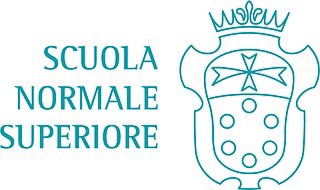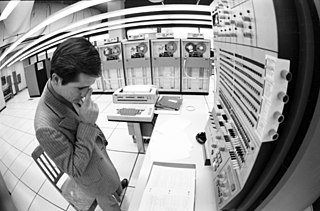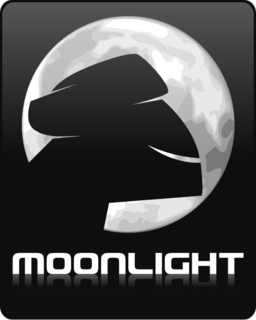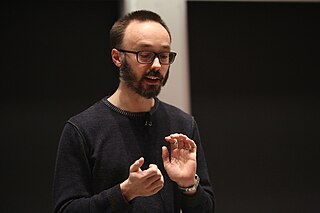
Bruce Perens is an American computer programmer and advocate in the free software movement. He created The Open Source Definition and published the first formal announcement and manifesto of open source. He co-founded the Open Source Initiative (OSI) with Eric S. Raymond. Today, he is a partner at OSS Capital.

A Linux distribution is an operating system made from a software collection that includes the Linux kernel and, often, a package management system. Linux users usually obtain their operating system by downloading one of the Linux distributions, which are available for a wide variety of systems ranging from embedded devices and personal computers to powerful supercomputers.

Open-source software (OSS) is computer software that is released under a license in which the copyright holder grants users the rights to use, study, change, and distribute the software and its source code to anyone and for any purpose. Open-source software may be developed in a collaborative public manner. Open-source software is a prominent example of open collaboration, meaning any capable user is able to participate online in development, making the number of possible contributors indefinite. The ability to examine the code facilitates public trust in the software.
Source-available software is software released through a source code distribution model that includes arrangements where the source can be viewed, and in some cases modified, but without necessarily meeting the criteria to be called open-source. The licenses associated with the offerings range from allowing code to be viewed for reference to allowing code to be modified and redistributed for both commercial and non-commercial purposes.

The Scuola Normale Superiore is a university institution of higher education based in Pisa and Florence, Tuscany, Italy, currently attended by about 600 undergraduate and postgraduate (PhD) students. It ranks first in Italy in the Per Capita Performance parameter of the "Academic Ranking of World Universities", second among Italian universities in the "Times Higher Education World University Rankings 2019", and first in Italy in the Teaching parameter.

Free and open-source software (FOSS) is software that is both free software and open-source software where anyone is freely licensed to use, copy, study, and change the software in any way, and the source code is openly shared so that people are encouraged to voluntarily improve the design of the software. This is in contrast to proprietary software, where the software is under restrictive copyright licensing and the source code is usually hidden from the users.
Free/open-source software – the source availability model used by free and open-source software (FOSS) – and closed source are two approaches to the distribution of software.
Alternative terms for free software, such as open source, FOSS, and FLOSS, have been a controversial issue among free and open-source software users from the late 1990s onwards. These terms share almost identical licence criteria and development practices.
The Sant'Anna School of Advanced Studies is a special-statute, highly selective public research university located in Pisa, Italy.

In the 1950s and 1960s, computer operating software and compilers were delivered as a part of hardware purchases without separate fees. At the time, source code, the human-readable form of software, was generally distributed with the software providing the ability to fix bugs or add new functions. Universities were early adopters of computing technology. Many of the modifications developed by universities were openly shared, in keeping with the academic principles of sharing knowledge, and organizations sprung up to facilitate sharing. As large-scale operating systems matured, fewer organizations allowed modifications to the operating software, and eventually such operating systems were closed to modification. However, utilities and other added-function applications are still shared and new organizations have been formed to promote the sharing of software.
Opposition to software patents is widespread in the free software community. In response, various mechanisms have been tried to defuse the perceived problem.

Moonlight was a free and open source implementation for Linux and other Unix-based operating systems of the now deprecated Microsoft Silverlight application framework, developed and then abandoned by the Mono Project. Like Silverlight, Moonlight was a web application framework which provided capabilities similar to those of Adobe Flash, integrating multimedia, graphics, animations and interactivity into a single runtime environment.
Linux began in 1991 as a personal project by Finnish student Linus Torvalds: to create a new free operating system kernel. The resulting Linux kernel has been marked by constant growth throughout its history. Since the initial release of its source code in 1991, it has grown from a small number of C files under a license prohibiting commercial distribution to the 4.15 version in 2018 with more than 23.3 million lines of source code, not counting comments, under the GNU General Public License v2.

Gian Biagio Conte is an Italian classicist and professor of Latin Literature at the Scuola Normale Superiore of Pisa.

Stefano Zacchiroli is an Italian and French academic and computer scientist who lives and works in Paris, and a former Debian Project Leader, a position in which he served from April 2010 to April 2013. Succeeding Steve McIntyre, he was himself succeeded by Lucas Nussbaum in an election where he himself was no longer a candidate. Zacchiroli became a Debian Developer in 2001. After attending LinuxTag in 2004, he became more involved in the Debian community and the project itself.
The Innovation and research initiative for free software is a French research center. This centre was created in September 2010 by INRIA with Pierre and Marie Curie University and Paris Diderot University and is located on the Jussieu Campus in Paris. Roberto Di Cosmo is the director of IRILL.
The use of free software instead of proprietary software can give institutions better control over information technology. A growing number of public institutions have started a transition to free-software solutions. This grants independence and can also address the often-argued need for public access to publicly funded developments. This is the only way that public services can ensure that citizen data is handled in a trustworthy manner since non-free software doesn't allow total control over the employed functions of the needed programs.
Software Heritage is a non-profit multi-stakeholder initiative unveiled in 2016 by Inria, and supported by UNESCO.

Roberto Battiston is an Italian physicist, specialized in the field of fundamental physics and elementary particles, and leading experts in the physics of cosmic rays. He was the president of the Italian Space Agency (ASI) from 2014 to 2018 and president of the Italian National Institute for Nuclear Physics (INFN) Committee on Astroparticle Physics from 2009 to 2014.










